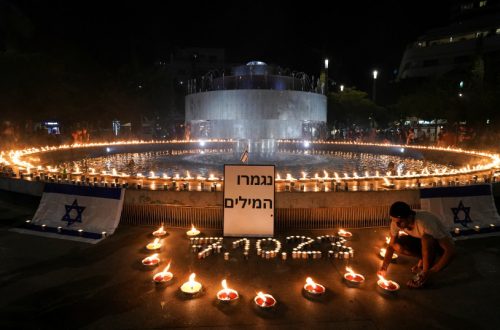This is a cross-post from falsedichotomies.com
The ever vigilant Phil Weiss brings us news that the Nakba has finally made it to the pages of the New York Review of Books, in the form of a critical review of David Grossman’s latest novel, To the End of the Land, by Patricia Storace. Weiss highlights “three devastating excerpts of the review.” First, Storace objects to Grossman not pointing out that “Ein Kerem [where the protagonists of the novel live] was once Ain Karim, a Palestinian village whose inhabitants were driven out in 1948…Ora’s stone house with arched windows and decorative floor tiles must surely be one of the Palestinian villas….the neighbourhood is little more than a name and a décor. Without its historical or social setting, we cannot fully grasp what living there might mean. We sense oppressively that we are being told one story to distract from others.” It is a strange, overwrought complaint. Storace does know that Ein Kerem was once Ain Karim; presumably other readers know this too, maybe even some Israeli ones. Surely she does not expect an author to spell out every last bit of historical background for his reader? A novel is not a work of history. And maybe Ein Kerem’s past as Ain Karim is more potent when left unmentioned.
The second objection is to Grossman’s depiction of the Israeli-Palestinian (Weiss petulantly describes him as plain Palestinian) driver character, Sami. “Ora’s privilege within the novel extends to her freedom to repeat ranting soliloquies about Arabs…It is unimaginable that Grossman would dare to allow the Palestinian character the same freedom in his thoughts about Jews, but in this and other passages…he reveals the pervasive intensity of the societal hostility to Arabs.” Of course, there is no evidence for her claim that it is unimaginable that Grossman would give the Palestinian character the same freedom in his thoughts about Jews, and one is immediately reminded of A.B. Yehoshua’s brilliant The Lover, published in 1978, in which an Israeli-Palestinian character gets the very freedom Storace seems so sure an Israeli-Jewish author would not dare bestow upon him. As for her second claim, that of “the pervasive intensity of the societal hostility to Arabs,” one can presume that she wouldn’t be as triumphant were the character an anti-Semitic Arab.
Finally, Storace notes that Grossman does not give sufficient background regarding Holocaust education in Israel: “The novel gives no description of this rite of passage,” before referring to an essay by the chairman of the Early Childhood Department of Efrata Teacher’s College about Holocaust education, in order to show that Israeli society is insanely paranoid. To be fair, she doesn’t criticise Grossman for not mentioning this stuff, and it may just be a case of Weiss projecting, but it seems another irrelevant criticism. The anti-Zionist project is totalitarian, which means absolutely everything that comes out of Israel (other than its critics) must be despised; hence the attempt to use Israeli fiction as a stick with which to beat Israeli society.
I am reminded of Borges’s seminal essay, The Argentine Writer and Tradition: “A few days ago, I discovered a curious confirmation of the way in which what is truly native can and often does dispense with local colour; I found this confirmation in Gibbon’s Decline and Fall of the Roman Empire. Gibbon observes that in the Arab book par excellence, the Koran, there are no camels; I believe that if there were ever any doubt as to the authenticity of the Koran, this lack of camels, or even camel medium for that matter, would suffice to prove that it is Arab. It was written by Mohammed, and Mohammed, as an Arab, had no reason to know that camels were particularly Arab; they were, for him, a part of reality, and he had no reason to single them out, while the first thing a forger, a tourist or an Arab nationalist would do is bring on the camels, whole caravans of camels on every page; but Mohammed, as a smoke and an Arab, was unconcerned; he knew he could be Arab without camels. I believe that we Argentines can be like Mohammed; we can believe in the possibility of being Argentine without abounding in local colour.” Storace and Weiss are demanding camels in the Koran, and camels with four humps at that.


